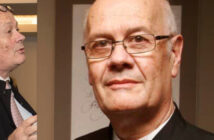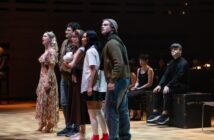
This page is also available in / Cette page est également disponible en:
![]() Francais (French)
Francais (French)
Michel Tremblay is a leading light in Quebec. For Quebecers he could perhaps even be called the leading light. Since the publication of his first collection in 1966, his stories, novels and plays have been part of our cultural landscape, whether for students who discover his novels in high school or for those who love to see (and return to) his theatrical works, which are never far from the stage in Montreal or elsewhere in the province. Since he has been a presence in the lives of Quebecers for more than half a century, we all have the impression of knowing Tremblay, from near or far. Yet few people are aware of this: he is an opera lover.
An operatic version of his play Albertine, en cinq temps, will be staged in 2022, just in time to celebrate the author’s 80th birthday. Whether as a listener, a member of the audience, or even a playwright, Tremblay has always made opera an important part of his life.
“Opera came to me as it came to all people of my generation, through the Metropolitan Opera radio broadcasts on Saturdays at 2 p.m.,” he recalls. “Surprisingly, a lot of Quebecers at that time listened to this as background music. At home, my older brother and my mother would listen to the Met broadcasts, so I spent my afternoons doing homework while listening to opera. I especially liked listening to the voices, the music, the rhythms, without really realizing that a story was unfolding. This, at the start, is what appealed to me the most.”
Tremblay’s interest quickly turned into a passion when, at age 15, he bought a recording of Lucia di Lammermoor with Maria Callas in the title role. The box set came with a booklet where the libretto, in Italian, was translated into English, allowing him, for the first time, to follow the story as it progressed. It was at this point that he began to go to the opera himself to hear the greatest Canadian voices of the era.
“I vividly remember going to see Roméo et Juliette with soprano Pierrette Alarie at Her Majesty’s Theatre, which no longer exists. It was remarkable that her husband, tenor Léopold Simoneau, with whom she always performed, had been replaced because he had to sing Messiah in Boston. At that time, there was also the Montreal Festivals, which presented a bit of everything. I saw a wonderful Werther with mezzo-soprano Fernande Chiocchio and tenor Richard Verreau, who was not a great actor but who had a wonderful voice. I bought tickets for everything. I was curious.”
Opera gradually became omnipresent in the life of Michel Tremblay. He drew on his enthusiasm for the genre to write La Nuit des princes charmants, in which his alter ego, Jean-Marc, decides to lose his virginity after attending a performance of Roméo et Juliette. In the preamble to this novel, we encounter very precise opinions about certain singers, the operatic repertoire and the relation of this artform to theatre.
He also believes that opera has had a great influence on his way of writing plays. Far from the realism of some of his contemporaries, his theatrical work is filled with elements that are drawn from opera.
“I have always dreamed of being able to write the quartet from Verdi’s Rigoletto in one of my plays. It’s a perfect moment, where all four singers are throwing different things at the audience at the same time. We stop listening to what they say and it creates an atmosphere, a mood. This is what I tried to do in À toi, pour toujours, ta Marie-Lou. When you attend one of my plays, if you close your eyes, what you hear will be very close to reality, especially in the language. If you open your eyes, what you see doesn’t make sense because I’m creating new structures. Each of my plays involves a different conception of time. Using time in a different way, I create structures that are not realistic. This is where opera comes in. If I hadn’t known opera, I wouldn’t have thought of doing this.”
In 1990, Tremblay wrote his only libretto, for Nelligan, a romantic opera composed by his friend and collaborator André Gagnon. The work has been revived several times, notably by the Orchestre symphonique de Montréal and at the Festival d’opéra de Québec. The most recent revival was given in January 2020 at the Théâtre du Nouveau-Monde, in a chamber version for two pianos and cello. “I approached writing the libretto as I would a play,” Tremblay recalls. “I asked André Gagnon and the directors to let me tell my story scene by scene and to let the arias and duets fall into place naturally. When I finished a scene, I would send it to André and then we met to organize it.”
Tremblay gave his blessing last year to director Nathalie Deschamps to create an adaptation of Albertine, en cinq temps, adding another chapter to his intimate relationship with opera. The music will be composed by Catherine Major and the libretto is the work of the Collectif de la Lune Rouge.
“What I want is for it to work,” Tremblay says. “I like stirring the pot and I like it when people try different things with my plays or my novels. That’s why I love Eurotrash when it tells the story of an opera. Why go see another Carmen with her hands on her hips, waddling with her castanets?”
Albertine en cinq temps – L’opéra is an original concept of Productions du 10 avril. Presented by the Scotiabank Women Initiative, a preview of the work in progress will be available for webcast Aug. 19-23. www.productionsdu10avril.com
This page is also available in / Cette page est également disponible en:
![]() Francais (French)
Francais (French)














